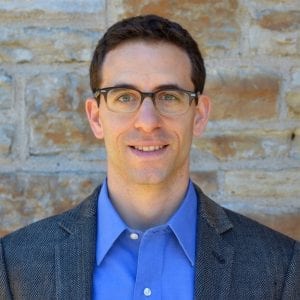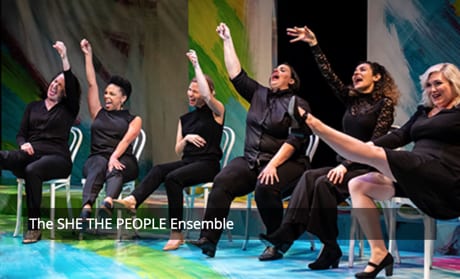My name is Louis Epstein, I’m an Assistant Professor of Music at St. Olaf College, and I have the pleasure and honor of teaching ID 242: Democracy and the Arts in Washington, D.C. during the 2020 January term. (Click here for a course description and for our learning objectives.)

Yours truly
Together with Alyssa Melby, my co-instructor, and 24 St. Olaf students, I get to spend 23 days in the US capital learning about how artistic practices and arts policies interact with democratic values, US American identities, and the lived experiences of communities at the local, regional, and national levels. This is an interdisciplinary fine arts class, so we’ll be attending performances and talking to practitioners in music, visual arts, dance, theater, and the literary arts. (Our first night in town we’ll kick things off by seeing an amazing show called She the People by Second City at Woolly Mammoth Theater, so add comedy to that list.)
This course was originally the brainchild of Jeanne Narum, a St. Olaf alumna, and Irve Dell, at the time Professor of Art and Art History and now Associate Dean of the Fine Arts at St. Olaf. They imagined an off-campus studies program through which students could experience the lively arts scene of DC while also interacting with arts professionals who could model the kinds of career paths and vocational commitments available to students in the arts. And since students would be in the capital, it made sense to think about that arts scene and those careers in the context of broader questions about democracy, civic engagement, and the place of art in US society.
I signed on to teach the course in part because these are the kinds of questions I ask in my research, which focuses on the ways politics and patronage shaped French classical music in the first half of the twentieth century. I know a fair amount about the art policies enacted by French governments one hundred years ago, but I know far less about what my own government does in the present day. This class seemed like a great opportunity to transfer some of my historical expertise to a contemporary context, and an even greater opportunity to learn alongside the students about not just governmental efforts to promote or constrain the arts, but also about the roles played by local and national non-profits, lobbying organizations, and individuals.
Before I sign off, I want to make clear that this class was a collaborative effort from the beginning, combining Jeanne’s and Irve’s vision with my own, and benefiting profoundly from the content knowledge and extensive professional connections of my co-instructor, Alyssa Melby, who serves as Assistant Director for Academic Civic Engagement at St. Olaf. Alyssa is our resident expert on local, state, regional, and federal arts policy and a wizard of logistics and organization. This course definitely would not exist in its current form without her, and I’m glad we’ll be leading this course together. Hope you check back frequently to see new student posts about our experiences and learn more about the intersections of democracy and the arts in Washington, D.C.!

